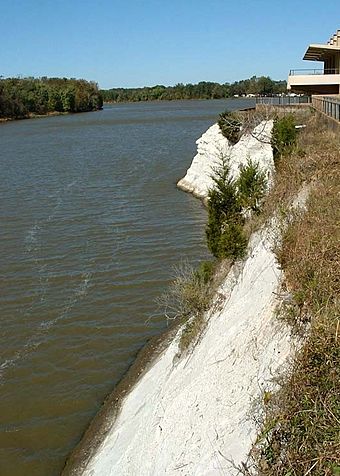White Bluff (Demopolis, Alabama) facts for kids
Quick facts for kids |
|
|
White Bluff
|
|

White Bluff, below the Demopolis Civic Center.
|
|
| Location | Arch Street, Demopolis, Alabama |
|---|---|
| Area | 6 acres (2.4 ha) |
| Built | 1817 |
| NRHP reference No. | 70000106 |
| Added to NRHP | August 25, 1970 |
White Bluff, also called Ecor Blanc, is a special historical place. It is found along the Tombigbee River in Demopolis, Alabama. This site is a tall cliff made of chalk. It stretches for about one mile.
This chalk cliff is part of a geological layer. It is known as the Demopolis Chalk Formation. This formation is part of a larger group called the Selma Group. Before a dam was built, the cliff was almost 80 feet (24 m) high. Now, it is about 30 feet (9.1 m) above the river.
Contents
What is White Bluff?
White Bluff is a natural chalk cliff. It is a very important landmark in Alabama. The cliff's white color comes from the chalk it is made of. This chalk formed over millions of years.
How the Cliff Formed
The chalk in White Bluff comes from tiny sea creatures. These creatures lived in an ancient ocean. When they died, their shells and skeletons sank. They piled up on the ocean floor. Over time, these layers turned into chalk.
The River's Role
The Tombigbee River helped create the cliff's shape. The river slowly wore away the land. This process, called erosion, exposed the chalk layers. It created the tall, steep cliff we see today.
A Look at White Bluff's History
White Bluff has a long and interesting history. Many different groups of people have used this site. It has been important for travel and settlement.
Early Names for White Bluff
In the 1700s, French explorers gave the cliff its first name. They called it Ecor Blanc. This French name means "White Bluff." It describes the cliff's striking appearance.
The cliff also had another name. It was known as the Chickasaw Gallery. This name came from early Native American groups. They would tie their boats at the bottom of the cliff. It was a safe place to stop along the river.
French Settlers Arrive
In 1817, a group of French refugees landed here. These people were called Bonapartists. They were supporters of Napoleon Bonaparte. They had to leave France. They came to America to start a new life.
They created a settlement called the Vine and Olive Colony. They hoped to grow grapes for wine and olive trees. White Bluff was their landing spot. It marked the beginning of their new home.
White Bluff Today
Today, White Bluff is still a special place. It is a key part of the annual Christmas on the River festival. This festival is a big event in Demopolis. The cliff provides a beautiful backdrop for the celebrations.
White Bluff was added to the National Register of Historic Places. This happened on August 25, 1970. This listing helps protect the site. It ensures its history and natural beauty are preserved.
Images for kids
 | Laphonza Butler |
 | Daisy Bates |
 | Elizabeth Piper Ensley |




